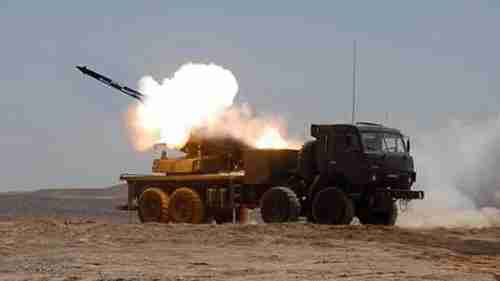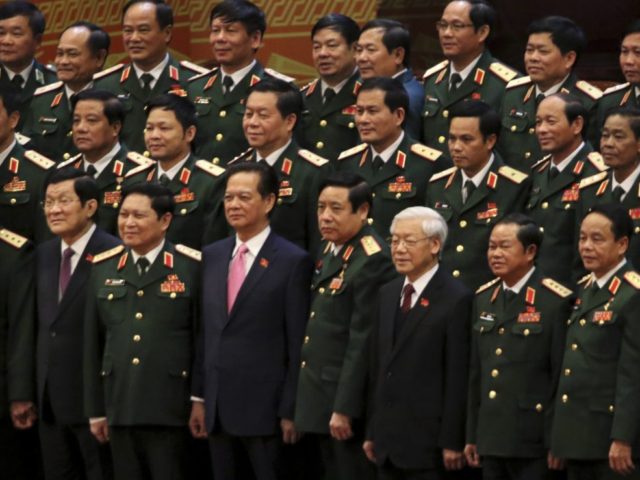This morning’s key headlines from GenerationalDynamics.com
- Vietnam deploys rocket launchers in South China Sea to confront China
- Japan-China relations ‘deteriorate significantly’ after repeated Chinese provocations
Vietnam deploys rocket launchers in South China Sea to confront China

EXTended Range Artillery (EXTRA) mobile rocket system from Israel Military Industries
Reports indicate that Vietnam is deploying rocket launchers on five of its bases in the Spratly Islands in the South China Sea. The launchers have been hidden from aerial surveillance and they have yet to be armed, but could be made operational with rocket artillery rounds within two or three days. Vietnam’s Foreign Ministry responded to the reports by saying that the information was “inaccurate,” without elaborating.
It is believed that Vietnam is deploying a state of the art EXTended Range Artillery (EXTRA) rocket system that it recently acquired from Israel Military Industries.
The EXTRA is a highly mobile weapon system and can be installed on either a truck or in a fixed installation. Vietnam procured the new mobile rocket launchers specifically with the Spratlys in mind given that it requires little logistical support – e.g., it only uses a small lightweight radar system — and has very low maintenance costs (EXTRA rounds come in disposable sealed canisters).
EXTRA is equipped with a GPS inertial navigation system that makes it highly accurate up to a range of 150 km (93 miles), with different 150 kg (330 lb) warheads that can carry high explosives or bomblets to attack multiple targets simultaneously. Operated with targeting drones, they could strike both ships and land targets. That puts China’s artificial islands, and the military installations installed on them, within range of the rocket system.
Vietnam and China have fought several wars in the last few decades. In a 1979 border war, China invaded Vietnam with 80,000 soldiers. They were driven back by the Vietnamese within six weeks, killing as many as 50,000 people on both sides. In their retreat, the Chinese implemented a barbaric scorched-earth policy, destroying every building and killing every animal. In 1974, China seized the Paracels by force from Vietnam, and in 1988, Chinese naval forces defeated the Vietnamese navy at Johnson South Reef.
So it is not an exaggeration to say that both sides are preparing for war, and in the current highly tense atmosphere, with surging nationalism and xenophobia on both sides, a war could start any day. Reuters and The Diplomat and Israel Military Industries
Japan-China relations ‘deteriorate significantly’ after repeated Chinese provocations
In moves that are apparently intended to provoke the Japanese, Chinese coast guard vessels have been entering waters surrounding the Senkaku/Diaoyu islands. The Senkaku Islands are governed by Japan, but are claimed by China as their sovereign territory.
According to Japan’s coast guard, 13 coast guard vessels sails through Japanese waters surrounding the Senkakus on Tuesday. This has happened already four times this month, and Tuesday’s incident was the third day in a row. It’s believed that some of the ships contain military forces.
Japan’s government summoned the Chinese envoy to launch a formal objection. According to Japan’s foreign minister Fumio Kishida:
The situation surrounding the Japan-China relationship is significantly deteriorating. We cannot accept that [China] is taking actions that unilaterally raise tensions.
At Wednesday’s US US State Dept. press briefing, spokesman Elizabeth Trudeau made a point of issuing a statement in defense of Japan:
We continue to closely monitor the situation around the Senkaku Islands. We are in close communication with the Japanese as allies and are also concerned about the increase of Chinese coast guard vessels in the vicinity of the islands. As you noted, the U.S. position on the Senkaku Islands, as stated previously by the President, is clear and longstanding. The Senkaku Islands have been under Japanese administration since the reversion of Okinawa in 1972, such they fall within the scope of the article 5 of the 1960 U.S.-Japan Treaty of Mutual Cooperation and Security. We oppose any unilateral action that seeks to undermine Japan’s administration of the Senkaku islands.
The statement contains an explicit reference to article 5 of the 1960 U.S.-Japan Treaty of Mutual Cooperation and Security. According to that treaty, US armed forces will defend Japan if China takes any military action against Japan or the Senkakus. Nikkei and BBC and US State Dept.
KEYS: Generational Dynamics, Vietnam, China, South China Sea, Spratly Islands, Israel Military Industries, EXTended Range Artillery, EXTRA, Japan, Senkaku Islands, Diaoyu Islands, Fumio Kishida, Elizabeth Trudeau, 1960 U.S.-Japan Treaty of Mutual Cooperation and Security
Permanent web link to this article
Receive daily World View columns by e-mail

COMMENTS
Please let us know if you're having issues with commenting.